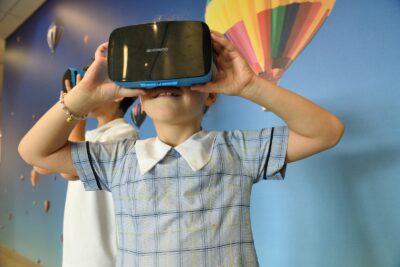5G-Enabled Remote Learning: A New Era for Education in the Gulf
The Impact of 5G on Remote Learning in Saudi Arabia
The advent of 5G-enabled remote learning marks a significant shift in the educational landscape, particularly in Saudi Arabia. The Kingdom’s Vision 2030 emphasizes the integration of advanced technologies to enhance various sectors, including education. With the implementation of 5G, remote learning is set to become more accessible and efficient, providing students with high-speed internet connections and enabling seamless access to online resources and virtual classrooms.
5G technology facilitates the development of sophisticated virtual learning environments that can simulate physical classrooms. These environments allow for real-time interaction between students and teachers, which is crucial for maintaining the quality of education. Moreover, 5G’s low latency ensures that live video lessons, interactive sessions, and collaborative projects can be conducted without interruptions, thereby enhancing the overall learning experience.
Furthermore, 5G-enabled remote learning addresses the geographical challenges faced by students in remote areas of Saudi Arabia. By providing equal access to quality education, 5G bridges the educational gap between urban and rural regions, promoting inclusivity and ensuring that all students have the opportunity to learn and succeed. This technological advancement aligns with the Kingdom’s goal of developing a knowledge-based economy.
Advancements in Virtual Classrooms in the UAE
In the UAE, the integration of 5G-enabled remote learning and virtual classrooms is transforming the educational sector. Dubai, known for its futuristic vision, is at the forefront of adopting 5G technology to revolutionize learning experiences. With 5G, virtual classrooms are becoming more immersive, offering students an interactive and engaging way to learn.
One of the key benefits of 5G in education is the ability to utilize augmented reality (AR) and virtual reality (VR) tools. These technologies create dynamic and interactive learning environments where students can explore subjects in a more hands-on manner. For instance, virtual field trips to historical sites or scientific laboratories can be conducted, providing students with experiences that were previously impossible in a traditional classroom setting.
Additionally, 5G enhances the use of AI-driven educational tools that personalize learning experiences for students. These tools can analyze students’ performance data in real-time, providing teachers with insights to tailor their teaching methods to individual needs. This personalized approach helps in addressing learning gaps and ensures that each student can progress at their own pace, thereby improving overall educational outcomes.
Effective Communication and Collaboration Through 5G
The implementation of 5G-enabled remote learning also fosters effective communication and collaboration among students and educators. In Riyadh and other major cities in Saudi Arabia, educational institutions are leveraging 5G to create collaborative platforms where students can work together on projects, share resources, and engage in discussions, irrespective of their physical locations.
These platforms support high-definition video conferencing and real-time document sharing, making it easier for students to collaborate on group assignments and for teachers to provide immediate feedback. The enhanced connectivity offered by 5G ensures that these interactions are smooth and uninterrupted, promoting a more cohesive learning environment.
Moreover, 5G technology enables the integration of blockchain in education. Blockchain can be used to securely store and verify academic records, credentials, and certifications, ensuring their authenticity and reducing the risk of fraud. This innovation not only streamlines administrative processes but also builds trust in the educational system, as students’ achievements can be easily verified by employers and other institutions.
Executive Coaching and Leadership Development in the Age of 5G
Transforming Executive Coaching with 5G Technology
The influence of 5G-enabled remote learning extends beyond traditional education into the realm of executive coaching and leadership development. In the UAE and Saudi Arabia, businesses are increasingly recognizing the value of continuous learning and professional development facilitated by advanced technologies. 5G allows for high-quality virtual coaching sessions, where executives can receive real-time feedback and engage in interactive training modules.
With 5G, executive coaching programs can incorporate sophisticated AI algorithms that analyze behavioral patterns and provide personalized coaching tips. This level of customization enhances the effectiveness of coaching sessions, helping leaders to develop the skills necessary to navigate the complexities of modern business environments. Furthermore, the use of VR in coaching can simulate real-world scenarios, allowing executives to practice decision-making and leadership skills in a safe and controlled setting.
Additionally, the seamless connectivity provided by 5G enables the creation of global coaching networks. Executives in Riyadh, Dubai, and other major cities can connect with expert coaches from around the world, gaining diverse perspectives and insights. This global approach to coaching not only broadens the knowledge base of executives but also fosters a culture of innovation and continuous improvement within organizations.
Enhancing Leadership Skills Through Virtual Workshops
Virtual workshops and training sessions are becoming increasingly popular as tools for leadership development in the UAE and Saudi Arabia. The introduction of 5G-enabled remote learning has significantly enhanced the delivery and effectiveness of these programs. Leaders can now participate in immersive virtual workshops that use AR and VR to create realistic business simulations and role-playing exercises.
These interactive sessions allow leaders to practice and refine their skills in areas such as strategic thinking, effective communication, and crisis management. The high-speed connectivity of 5G ensures that these workshops run smoothly, providing a seamless learning experience that closely mimics in-person training. Additionally, the ability to record and playback sessions allows participants to review their performance and identify areas for improvement.
The use of AI in virtual workshops also plays a crucial role in leadership development. AI-powered analytics can track participants’ progress and provide real-time feedback, highlighting strengths and areas that need attention. This data-driven approach enables a more targeted and effective training program, ensuring that leaders acquire the skills necessary to drive business success in a rapidly changing environment.
Project Management and 5G: A Winning Combination
Project management is another area where 5G-enabled remote learning is making a substantial impact. In both Saudi Arabia and the UAE, organizations are leveraging 5G technology to enhance project management practices and improve overall efficiency. The high-speed connectivity and low latency of 5G enable real-time collaboration and communication among project teams, regardless of their geographical locations.
With 5G, project managers can use advanced tools and platforms to monitor project progress, manage resources, and address issues promptly. The integration of AI and machine learning algorithms in these tools provides predictive analytics, helping managers to anticipate potential risks and make informed decisions. This proactive approach ensures that projects are completed on time and within budget, contributing to the overall success of the organization.
Furthermore, 5G technology supports the use of blockchain in project management. Blockchain can be used to create transparent and immutable records of project transactions, enhancing accountability and trust among stakeholders. This technology also facilitates secure and efficient contract management, reducing the administrative burden on project teams and allowing them to focus on core project activities.
Conclusion: Embracing 5G for a Brighter Educational Future
In conclusion, the integration of 5G-enabled remote learning and virtual classrooms is set to revolutionize the educational landscape in Saudi Arabia and the UAE. By providing high-speed connectivity and facilitating the use of advanced technologies such as AR, VR, AI, and blockchain, 5G is enhancing the quality of education and making it more accessible to all students. This technological advancement not only supports traditional education but also extends to executive coaching, leadership development, and project management, driving business success in the region.
As Saudi Arabia and the UAE continue to invest in 5G infrastructure, the potential for innovation in education and business will only grow. By embracing these advancements, educational institutions and organizations can stay ahead of the curve, ensuring that their students and employees are equipped with the skills and knowledge needed to thrive in the digital age.
The future of education and business in the Gulf region is bright, and 5G-enabled technologies are at the forefront of this transformation. By leveraging the power of 5G, Saudi Arabia and the UAE can achieve their visions of a knowledge-based economy and a thriving, innovative society.
#5G, #RemoteLearning, #VirtualClassrooms, #EducationTechnology, #SaudiArabia, #UAE, #Riyadh, #Dubai, #BusinessSuccess, #ManagementConsulting, #AIinEducation, #BlockchaininEducation, #MetaverseinEducation























